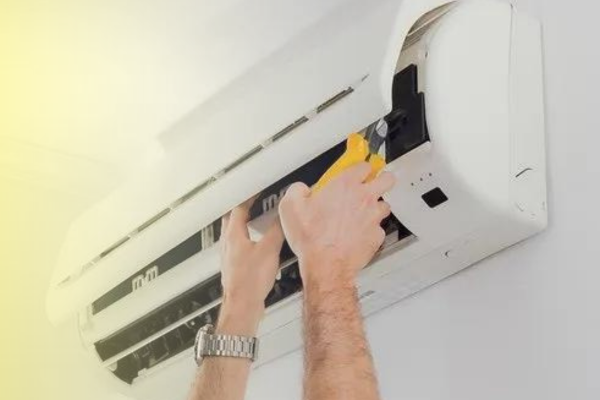
Maintaining a well-functioning air conditioner is crucial, especially during the scorching summer months. Regular maintenance not only makes your AC live a longer life but also reduces the risk of unwanted AC problems.
In this blog, we’ll share essential AC repair tips to help you keep your system in top shape. This blog will help you to understand the workings of AC and how to deal with AC repair on your own.
One of the simplest yet most effective AC repair tips is to replace or clean your air filters regularly. Clogged or dirty filters can restrict airflow, forcing your AC to work harder and potentially leading to system failures. Check your filters monthly, especially during peak usage periods, and replace or clean them as needed. For reusable filters, a gentle wash with water and mild detergent can do wonders.
AC coils play a significant role in cooling the air. Over time, they can accumulate dirt and debris, reducing their efficiency. Clean the condenser coils at least once a year. For the coil, a soft brush or a vacuum cleaner can help remove dirt.
Make sure your coil is away from dust and leaves this can make your AC more damaged. Regular coil maintenance is an essential aspect of AC repair.
A malfunctioning thermostat can lead to inconsistent cooling and increased energy bills. Ensure that the thermostat is set to the proper temperature and is in good working condition. For better control, consider upgrading to a programmable or smart thermostat.
These devices can optimize your AC performance by adjusting the temperature based on your time, leading to energy savings.
The drain line removes condensation from your AC unit. Over time, it can become clogged with algae, mould, or debris, leading to water damage and decreased efficiency. Inspect the drain line periodically and clean it using a mix of bleach and water.
Pour the solution into the drain line to clear any blockages. Regular cleaning of the drain line is a crucial step in AC repair and maintenance.
Proper insulation around your air conditioning ducts can prevent cool air from escaping, ensuring your unit works efficiently. Inspect the ductwork for any leaks or damaged insulation and repair them as necessary. Sealing leaks and ensuring adequate insulation can improve your AC’s performance and reduce energy consumption.
The outdoor unit (condenser) needs ample space to operate efficiently. Ensure there are no obstructions like plants, debris, or fences within two feet of the unit. Regularly check for and remove any debris to allow proper airflow. Keeping the outdoor unit clear is a simple yet vital AC repair tip.
While there are many AC repair tasks you can handle yourself, some require professional expertise. Schedule annual maintenance with a qualified technician to inspect and service your unit. Technicians can identify and fix issues that might not be visible, and make sure your AC operates in good condition.
Refrigerant is essential for cooling the air in your home. Low refrigerant levels can indicate a leak and lead to poor cooling performance. If you notice your AC is not cooling as properly as it used to, have an expert check the refrigerant levels and notice any leaks. Proper refrigerant levels are crucial for optimal AC performance.
Strange noises from your AC unit can indicate underlying problems. Listen for rattling, buzzing, or grinding sounds and investigate their source. Common causes of unusual noises include loose components, motor issues, or debris caught in the fan. Addressing these noises promptly can prevent more significant AC repair issues down the line.
Loose or corroded electrical connections can lead to AC malfunctions or even pose a fire hazard. Regularly inspect the electrical connections of your AC unit and tighten any loose wires. If you notice signs of corrosion or damage, call a professional to handle the repairs. Ensuring secure electrical connections is a key part of AC repair safety.
Regular maintenance and timely repairs are essential for keeping your AC unit running efficiently and prolonging its lifespan. With these AC repair tips, you can prevent common issues, improve performance, and ensure a comfortable environment all year round. Remember, while some tasks can be done yourself, it’s always best to get a help from technician for more critical repairs and annual maintenance. Stay cool and enjoy the benefits of a well-maintained air conditioner.